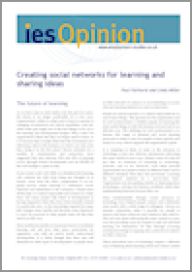Publications
 We author and publish a range of resources to keep you up to date with the latest developments in employment, labour market and human resource policy and practice.
We author and publish a range of resources to keep you up to date with the latest developments in employment, labour market and human resource policy and practice.
All our pdf publications are free to access.
Search results
-

Creating social networks for learning and sharing ideas
Fairhurst P, Miller L | Oct 2011 | Institute for Employment StudiesThis paper discusses the potential for new technologies and social networking to facilitate new ways of learning. It presents key themes from research carried out for the NHS into establishing new social networks for knowledge and idea sharing, and also offers hints and tips for establishing a new online community.
-

Urban and Rural Issues for the Health Sector in Scotland
Miller L, Robinson D, Butler M, Chubb C, Oakley J | Oct 2011 | Skills for HealthSkills for Health commissioned research to examine the ways in which the Scottish Territorial Health Boards had addressed the challenges of serving an ageing, rural and remote population, compounded by the smaller number of working age people in these areas as well as ICT and travel infrastructure issues. Skills for Health aimed to use these lessons to inform health delivery policy and skills development in Scotland and across the UK more widely.
-
📄
Wages, productivity and employment: a review of theory and international data
Meager N, Speckesser S | Sep 2011 | European Employment ObservatoryThis paper explores the relationship between productivity growth and wage growth and its importance for employment outcomes, drawing on two main sources: a review of the economic literature and an analysis of international data.
-

IES Annual Review 2011
Sep 2011 | Institute for Employment StudiesIES Annual Review 2011
-
📄
European Restructuring Monitor Quarterly - 2011, Issue 3
Hurley J, Riso S, Salvatore L, Rinawi M, Broughton A | Sep 2011 | European Foundation for the Improvement of Living and Working ConditionsThe economic situation continued to be dominated by sovereign debt problems in the eurozone countries. As these continued to remain unresolved, general sentiment had turned negative amid fears of a new second phase of the Great Recession of 2008–9. Growth outlooks in the developed economies had recently been scaled back with below trend growth forecast for 2011–12. Austerity programmes, which had begun to negatively impact public employment, especially in local and central government administrations, had not thus far been accompanied by the hoped-for handover from public to private demand. Within the EU, there were a number of different labour market stories reflecting very different trajectories during and after the 2008–9 crisis. Unemployment in Spain and Ireland continued to rise while other countries severely affected by the crisis – notably the Baltic states – showed signs of a strong recovery. The German unemployment rate was at its lowest level in nearly twenty years (6%) despite a recent easing of growth while the UK unemployment rates were at an eighteen-year high (8.1%). Meanwhile in Greece unemployment had risen by 4 percentage points in the last twelve months.
-

Management practices and sustainable organisational performance: an analysis of the European Company Survey 2009
Cox A, Higgins T and Speckesser S | Sep 2011 | European Foundation for the Improvement of Living and Working ConditionsThis report is based on secondary data analysis of Eurofound’s European Company Survey (ECS) 2009. It explores the links between a broad range of workplace practices and sustainable organisational performance, building on the survey report. The report develops a theoretical and analytical framework against which questions from the ECS are mapped and then subjected to a range of multivariate analyses.
-

Industrial relations and working conditions developments in Europe 2010
Sweeney B, Curtarelli M, Aumayr C, Vargas O, Cabrita J, Broughton A | Sep 2011 | European Foundation for the Improvement of Living and Working ConditionsWith a particular focus on the crisis and responses to it, this annual review highlights developments in working conditions and industrial relations in the EU Member States and Norway in 2010, both at national and EU level.
-

Leadership and worker involvement on the Olympic Park
Lucy D, Tamkin P, Tyers C, Hicks B | Sep 2011 | Health and Safety ExecutiveThe HSE commissioned this research into leadership and worker involvement across projects on the Olympic Park to understand the degree to which approaches impacted positively or negatively and could be transferable to other construction projects and industries. This research project sought to explore the range of initiatives and approaches used, their impact on worker involvement, attitudes and behaviours, and other desired outcomes and the context in which they were effective or ineffective.
-

Routes onto Employment and Support Allowance
Sissons P, Barnes H, Stevens H | Aug 2011 | Department for Work and Pensions (DWP)This report presents findings from a two-wave survey of people who claimed ESA between April and June 2009. It examines the social characteristics of ESA claimants and their employment trajectories over a period of approximately 18 months. The aim of the report is to provide information about who flows onto, and off ESA and the reasons for doing so.
-

Obtaining Customer Feedback on HR
Finding out what managers and employees think of HR services and the HR function
Carter A, Hirsh W, Mercer M, Reilly P | Aug 2011 | Institute for Employment StudiesThere continues to be a lively debate in organisations about whether to seek the views of customers about HR (and which customers to ask) and, if so, how to go about it. By talking to a number of different organisations, IES researchers looked at why they chose to do so, and the varying methods used.
